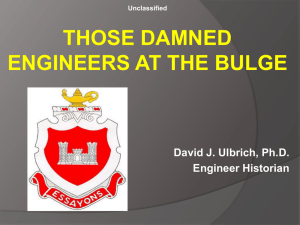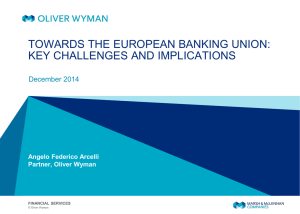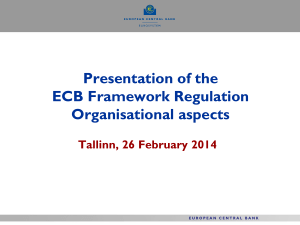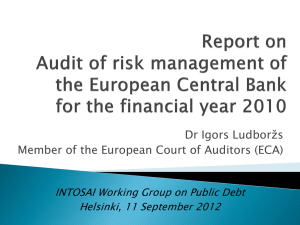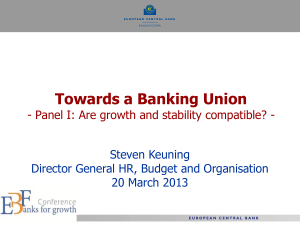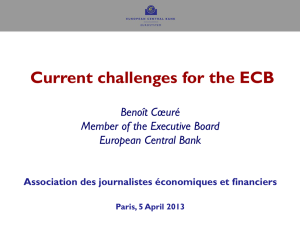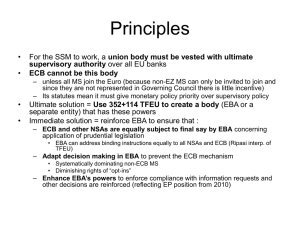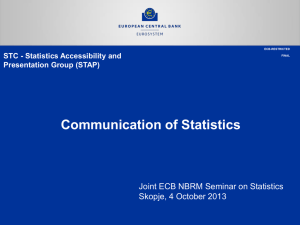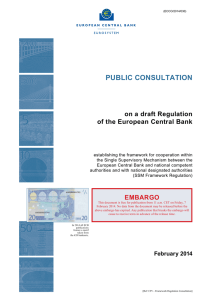The Single Supervisory Mechanism
advertisement
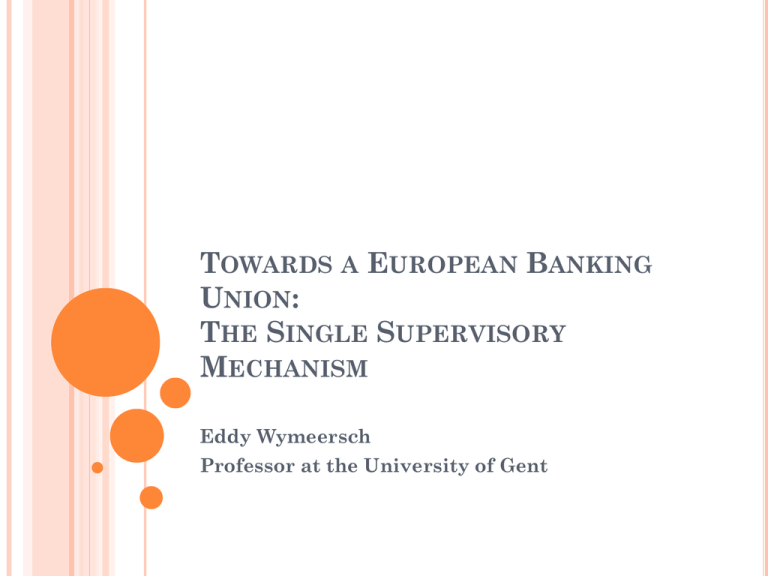
TOWARDS A EUROPEAN BANKING UNION: THE SINGLE SUPERVISORY MECHANISM Eddy Wymeersch Professor at the University of Gent 1. BACKGROUND ELEMENTS (a) The BU is composed of three parts: TCGD 17 Dec 2012 The SSM, Single Supervisory mechanism The Deposit guarantee System or DGS – 2010 proposal- little progress The Banking resolution and recovery proposal, BRR- ongoing work- announced for summer 2013 2 (B) WHY THE SSM - 1 This TCGD 17 Dec 2012 is another child of the financial crisis Financial integration has slowed down considerably Private debt has become public debt, with a risk for public finances, and hence for the euro; local bank rescues may affect other member states 3 •WHY THE SSM ? -2 Differences in supervisory regimes are considerable Strict, political neutral supervision as a precondition for financial support ESM/ health EMU Strengthening the supervisory regime as a precondition for re-establishing market confidence- part of overall political strategy of the Euro states for integration Step to the overall strengthening of the Euro zone and the Union in general TCGD 17 Dec 2012 4 A FEW CONCEPTS 1. Regulation v supervision TCGD 17 Dec 2012 Difference EBA v SSM 2 The SSM is not an institution but a Mechanism within the ECB: One single mechanism to which NCAs are associated Ultimate decisions are for ECB, Governing Council But NCA have to be involved in actual supervision; where to draw the lines? Internal organisation within ECB: Sup Board, internal Dpt, Staff rules 5 3. LEGAL BASIS TCGD 17 Dec 2012 Text of art 127 (6) Treaty Functioning of EU (6) “The Council, acting by means of regulations in accordance with a special legislative procedure, may unanimously, and after consulting the European Parliament and the European Central Bank, confer specific tasks upon the European Central Bank concerning policies relating to the prudential supervision of credit institutions and other financial institutions with the exception of insurance undertakings.” 6 SCOPE UNDER ART 127(6) Only “credit institutions”- Formal criterion Not insurance, not all other financial institutions Not: Shadow banking, infrastructure, asset managers etc TCGD 17 Dec 2012 Arbitrage ; banks becoming brokers? Infrastructure as banks Extension of the regime without Treaty Change? Unlikely Only Euro area: rooted in the Treaty part of Powers of ECB 7 SCOPE UNDER ART 127(6) TCGD 17 Dec 2012 Opt-in for non-euro states (participating states) on voluntary basis – national delegation to SSM Regulation: E Parliament was not involved, but accountability to EP Regulation adopted on 12/13 Dec 12 unanimously by all MS Non-Euro did not block 8 BASIC POLICY OPTIONS Principle: ECB has Treaty assigned overall competences, All credit institutions included: art 4(1) NCA remain active in “complement” Many financial institutions remain under NCA: Non-credit financial institutions, payment institutions, CCPs, CSD if not banks Money laundering, consumer law, securities rules 3rd country branches and services TCGD 17 Dec 2012 9 SSM IS ONLY SUPERVISION, NOT REGULATION Dichotomy: apply national rules provided conforming to EU law However increasingly use of regulations, i.e. directly applicable rules, no transposition (CRR, Mifir) On the way to the European Rulebook via EBA TCGD 17 Dec 2012 Regulation is national, implementing directives have to be transposed in national law + additional national rules 10 THE REGULATION’S POLICY OPTIONS ECB /NCA (=national competent authorities) how to divide supervisory fields TCGD 17 Dec 2012 Evident: Not all 6000 banks can be supervised by ECB Where to draw the line, but maintaining coherence of the SSM ECB responsible for the entire SSM: art 127 (6) Responsible for the effectiveness of SSM with respect to all banks Treaty provides no exceptions 11 THE REGULATION’S POLICY OPTIONS Directly supervised banks = First tier banks Nationally supervised banks – Second tier Prime national supervision However indirectly ECB: Is fully informed about these banks ECB can adopt regulations, guidelines Instructions to national supervisor ECB can pre-empt national supervision at any time on own initiative or on request TCGD 17 Dec 2012 Direct ECB supervision, but with technical cooperation and assistance from national supervisors 12 DIRECT ECB SUPERVISION 150-200 banks Largest + State support Branches and Services of non-participating Member States - Art 4 (2), but not Subsidiaries TCGD 17 Dec 2012 Defined as 20% of GDP of home, or 30bn banking assets (unless less than 5Bn; including off balance sheet?) + cross border; or Optional: subs in min 2 MS and considerable cross border activity; or Min 3 banks in each MS, unless considered less significant; On consolidated and solo basis Support by ESM or EFSF, also ? State: if indirect ESM support? 13 ECB’S DEFINED SUPERVISORY POWERS a -is the list limitative? b - macroprudential (system. provision, anti-cyclical buffers) are national but if needed with add-on by ECB TCGD 17 Dec 2012 authorisation, withdrawals, establishing branches, acquisition or disposal of significant holdings, regular prudential tools, governance, remuneration, stress tests, supervisory review, etc. Risks often dominated by local circumstances c- Banking resolution: national, with ECB assistance/cooperation No decision yet on a Europe-wide resolution authority (likely) , not on a resolution fund (much opposed - see ESM) 14 ECB’S DEFINED SUPERVISORY POWERS Supervisory measures: o o o o o o o TCGD 17 Dec 2012 o additional own funds and/or provisioning, ensure compliance with supervisory requirements, limitation to businesses or even divestments, risk reduction, reduce variable remuneration, limit dividends, impose liquidity requirements, remove members of the management board as not being “fit and proper” . 15 HOME-HOST IN THE EURO AREA ECB replaces national supervisors Includes EU branches and services provided intra EU Supervisor for outside EU branches/services; coordinator for financial conglomerates incl subs TCGD 17 Dec 2012 Home/host not applicable anymore: but only for supervisory purposes; branches and subsidiaries are supervised the same way, but home national law will play for subsidiaries Applies to euro-area and non-euro participating states ECB (Lead) college member-supervisor for euro area first tier banks with subs in nonparticipating states and third states 16 HOME-HOST REGIME FOR EU-NONEURO BANKS Branches – services Subsidiaries TCGD 17 Dec 2012 ECB competence art 4 (2) Branches –Services of banks from non-participating Member states: ECB direct supervision; art.4(2) but if converted to sub, than local supervisio Initial authorisation: ECB on proposal from NCA Idem withdrawal Ongoing supervision: National regime Local regime, unless very significant based on parameters Except: subs of non-participating Member states : if active in many states and having substantial cross border activity: direct ECB supervision optional 17 THIRD COUNTRY BANKS ESTABLISHING IN EU branches In non-participating states; Branches/subs :national regime, outside SSM In Participating states: Branches national regime Subs: national regime, even if important cross border activity TCGD 17 Dec 2012 18 NCA FIRST LINE - ECB INDIRECTLY Not by delegation but as part of the SSM NCA in its own right; final NCA decisions. Based on national law Indirect: TCGD 17 Dec 2012 Direct NCA supervision for smaller banks Must follow ECB instructions ECB can always step in directly, with/without agreement of NCA For ensuring consistent application of supervision When support of ESM or EFSF has been requested Supervisory “Framework “for implementation practicalities and procedures” 19 NON-EURO AREA PARTICIPATING STATES Opt-in at request of MS, ECB decision, non implementation is termination, right to withdraw for MS No co-decision right TCGD 17 Dec 2012 MOU also for non -participating MS that are home to subs and branches Candidates: Central-Eastern states, Poland? Hungary? Not UK, Sweden, Check Republic (before elections) 20 GOVERNANCE Separation supervision from monetary functions: mediation panel when differences appear between Gov C and MS- “resolves differences” TCGD 17 Dec 2012 Governing Council is ultimate decisional body 21 SUPERVISORY BOARD 1. Composition: Each MS + 4 ECB + chair independent /vice chair ECB TCGD 17 Dec 2012 steering committee decision making in Sup Board: preparatory to Gov C voting 1 vote per member, casting vote for chair; QMV for regulations 2. Relation Gov C. and Sup Board: decisions adopted unless rejected by Gov C 3. Accountability to EP, Council /eurogroup. Commission; Nation parliaments 22 SUPERVISION IN THE ECB Supervisory department Within ECB; separate from other departments Application of ECB staff rules, eg on confidentiality Funded by fee on supervised institutions Internal review: Review panel Internal review: SupBoard: reconsider and send new draft to Gov C. that should object, not agree Only at request of aggrieved party, not of NCA Procedure and substantive legality, not policy ECJ against Gov C decisions EBA rules for conflicts among NCA, with ECB TCGD 17 Dec 2012 23 EUROPEAN BANKING AUTHORITY Acting for the whole EU, include Euro area Powers remained unchanged Decision making TCGD 17 Dec 2012 Proposal for RTS Implementation of Union law Emergency powers Conflict resolution Majority of the Euro area + majority in the non-Euro area All subject to European parliament decision 24 ENTRY INTO FORCE Entry into force Regulation enters into force 5 days after publication 2013 EP in April; will it change? And what? Roll out in 2013, final on the 1st March 2014. For ESM supported banks: ECB starts immediately ECB publishes regulations on operational implementation TCGD 17 Dec 2012 25 OVERALL ASSESSMENT Major step in the right direction Positive Effect on resolving the financial crisis Provided it is followed by to be followed by DGS and BRR (June13) ESM’s operational start needed TCGD 17 Dec 2012 A model for Insurance and Securities supervision? Unlikely except after Treaty change 26 OVERALL ASSESSMENT Can the ECB cope? Staffing? Relations NCAs Non Euro states; opt-in is now more attractive: same treatment but leave if too burdensome Single rule book: long term Review Mechanism: possible conflict with EBA’s conflict resolution mechanism Governance is not very clear Two tier system TCGD 17 Dec 2012 Governing council: “decides” or “negative decision” Sup Board as default 27
